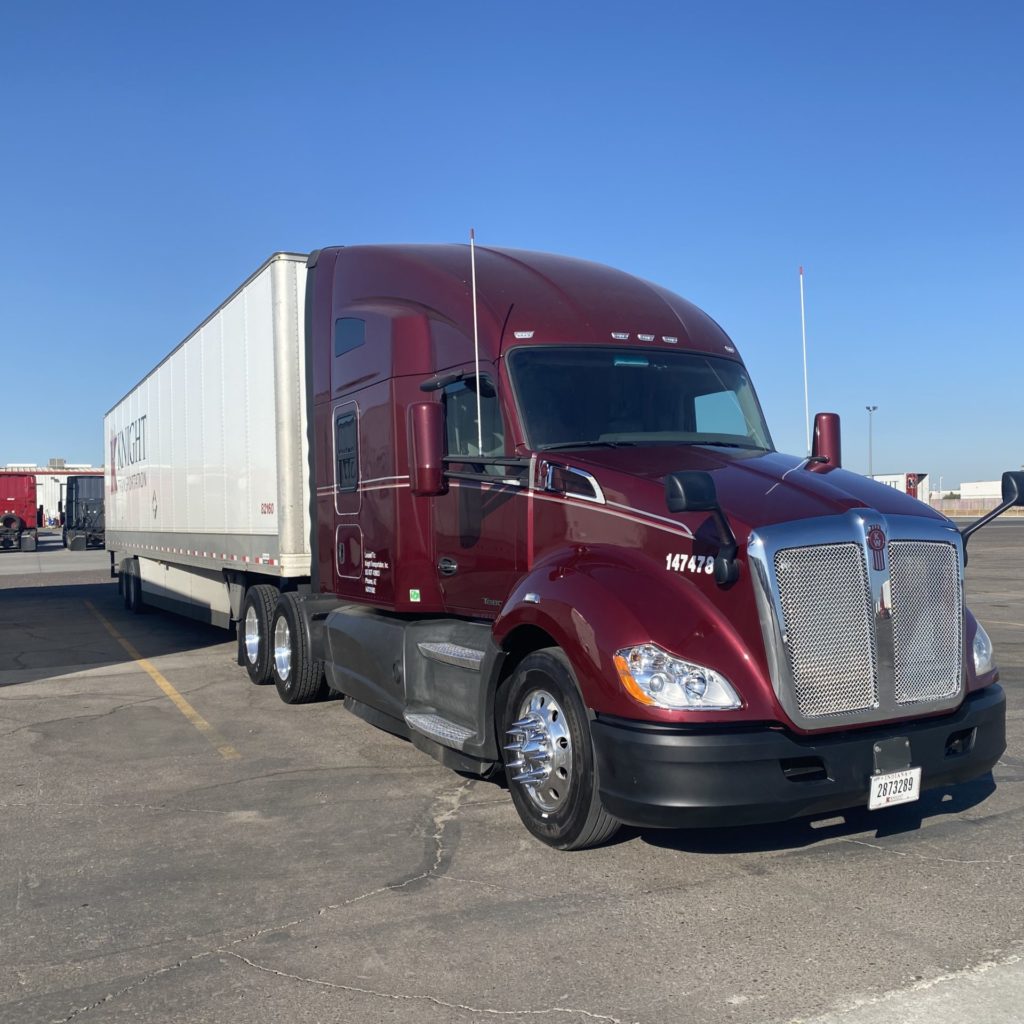What is Dry Van Trucking?

Are you a new truck driver who just finished CDL school and training? Congratulations on earning your Class A Commercial Driver’s License (CDL)! Now that you have achieved this significant milestone, it’s time to explore the diverse opportunities the trucking industry has to offer. One of the most common and versatile segments is dry van trucking. In this comprehensive guide, we will delve into the world of dry van trucking, providing essential insights and knowledge to help you make informed decisions as you embark on your truck driving career.
What is Dry Van Trucking?
Definition:
Dry van trucking refers to the transportation of goods using dry van trailers, which are enclosed and non-refrigerated trailers designed to protect cargo from external elements during transit.
Explanation of Design and Construction:
Dry van trailers are typically made of aluminum or steel and have a rigid, box-like structure. They feature double doors at the rear for easy loading and unloading and a roof to shield cargo from rain, snow, and debris.
Overview of Purpose and Functions of Dry Van Trailers:
The primary purpose of dry van trailers is to transport a wide range of goods and products securely from one location to another. They are especially useful for dry, non-perishable items and are the most common type of trailer used in the trucking industry.
What Do Dry Vans Haul?
Various Goods and Products:
Dry vans can transport an array of commodities, including but not limited to:
- Consumer goods (electronics, appliances, clothing, etc.)
- Non-perishable food items (canned goods, packaged snacks, etc.)
- Paper products and office supplies
- Building materials (lumber, cement bags, etc.)
- E-commerce shipments and parcels
- Pharmaceuticals
- And more!
Why Use Dry Vans for Transportation?
Advantages:
- Weather-resistant: Dry van trailers shield cargo from adverse weather conditions, reducing the risk of damage during transit.
- Secure: Enclosed trailers offer added security against theft and tampering.
- Versatility and Compatibility: Dry vans can be used with various truck types, making them readily available for transportation needs.
- Easy to Load and Unload: With rear double doors, loading and unloading cargo becomes efficient and convenient.
- Cost-effectiveness: Dry van shipping is generally more affordable compared to specialized trailer types.
How Does Dry Van Differ from Other Forms of Shipping?
Compared to Other Forms:
- Flatbed Trailers: Unlike dry vans, flatbed trailers are open and are suitable for oversized or irregularly shaped cargo.
- Refrigerated Trailers: Refrigerated trailers maintain temperature-controlled environments, ideal for perishable goods.
- Tanker Trucks: Tankers transport liquids and gasses, such as fuel, chemicals, and food-grade products.
- Intermodal Shipping: Intermodal involves using multiple modes of transportation (e.g., trucks, trains, ships) for long-distance hauling.
- Less Than Truckload (LTL) Shipping: LTL shipping consolidates shipments from multiple customers into one truckload, allowing cost-sharing.
Dry Van Trailer Dimensions
Overview of Standard Dimensions:
- Length: Typically 48 or 53 feet, with some variations available.
- Width: Standard width is 8.5 feet.
- Height: The standard height is 13.5 feet, but some trailers may vary slightly.
- Interior Capacity: Ranges from 3,500 to 4,000 cubic feet.
- Door Dimensions and Configurations: Door dimensions usually measure 8 feet in height and 8 feet in width, while configurations may include swing doors or roll-up doors.
Benefits of Dry Van Shipping
Advantages:
- Flexibility and Widespread Availability: Dry van trailers are readily available, providing a wide range of transportation options.
- Security of Cargo: Enclosed design enhances cargo security, reducing the risk of theft or damage.
- Cost-effectiveness and Efficiency: Dry van shipping is cost-effective, especially for non-perishable goods.
- Simplified Logistics: Dry van trucking involves straightforward logistics and less complex loading and unloading processes.
- Suitable for Short and Long Haul Transportation: Dry van trailers are versatile, making them suitable for both short and long-distance hauling.
Conclusion
As a newly licensed Class A CDL holder, you now have a deeper understanding of dry van trucking and its significance in the transportation industry. The benefits of dry van shipping, such as weather protection, cargo security, and cost-effectiveness, make it a popular choice for both trucking companies and shippers.
Embark on a rewarding truck driving career with Knight Transportation, a trusted industry leader known for its commitment to safety, professionalism, and excellence. Join our team today and experience the thrill of the open road while delivering essential goods across the nation.
Join the Knight Transportation Family
Ready to take the wheel and kickstart your trucking journey? Join the Knight Transportation family, where your skills and ambitions will be valued and supported. Apply now and be a part of a team that moves America forward.
Remember, as a professional truck driver, you have a critical role in keeping the economy moving. Drive with pride, responsibility, and a commitment to safety, and the road ahead will be full of endless possibilities.
Disclaimer: The information provided in this blog is for general guidance and understanding purposes only. Specific regulations and practices may vary based on location and company policies. Always consult professional authorities and your employer for up-to-date guidelines and information.
